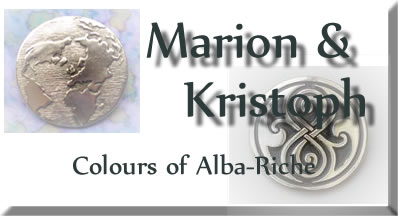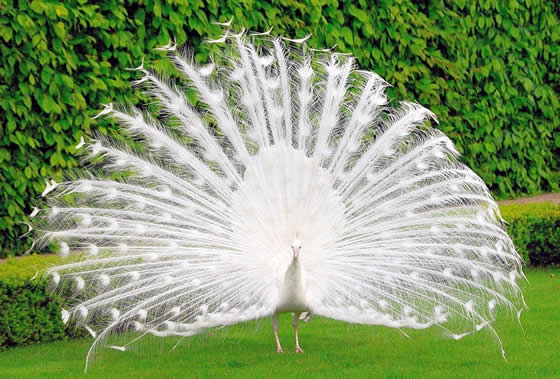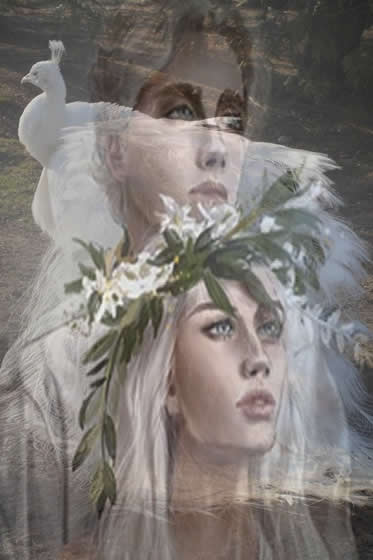

Marion woke a little after dawn on Alba-Riche, to the sound of a peacock crying out in the formal garden below the bedroom window. She slipped out of bed leaving Kristoph peacefully sleeping and put on a silk overgown before stepping out onto the balcony.
It was a beautiful morning. Every morning on Alba-Riche was beautiful, she was told. The planet’s weather was naturally temperate all year round, and like Camelot it never rained until after sundown – well, an hour before sunrise, actually, due to something rather complicated to do with the way clouds formed in the unusual atmosphere. By the time the sun rose, the water was soaking into the soil and making it a wonderfully fertile world.
She looked up at the pearly white sky. It wasn’t a cloudy sky, it was perfectly clear. This was one of the rare worlds, like her adopted home of Gallifrey, where the sky was any colour but blue. Alba Riche always had a white sky with a pale yellow-white sun in it and, at certain phases and certain times of the month, a silver-grey-white moon.
She looked down at very pale green grass and slightly darker leaves on the topiary hedges. The peacock that had given her the wake-up call displayed itself elegantly. It was pure white, of course. The really odd thing about Alba-Riche was that every animal life form, including the people, was albino. There was something, again more complicated than she cared to think about so early in the day, that inhibited pigmentation. Just occasionally, an animal might be born that did not have the inhibiting gene, but that would be a rare thing, worthy of mention in the media, and more often than not ending up in a zoo for such curiosities.
Marion didn’t know if there were ever children born with colour in the eyes and hair, or what became of them if they did.
She watched as a small figure came out into the garden, dressed for riding. Rodan was very pleased with this planet. It had horses – white ones, of course. She had risen early, assisted by her maid to dress in her riding habit, and had spent at least two hours before breakfast at her favourite outdoor occupation. The paddock lay beyond the formal garden. She shooed the peacock out of her way as she crossed the lawn. It retreated to another part and displayed itself again for her benefit.
Marion was watching her fosterling practicing the jumps set up just for her when she saw a movement that appeared to answer the question she had been meaning to ask for several days – about non-albino children. Surely that was a child with black hair who scampered across the lawn and behind the hedge. She watched carefully and the little girl appeared again, carrying a handful of pale coloured fruits that grew in the orchard beside the kitchen herb garden. She moved with the furtive energy of one who may not have had permission to take the fruit and was quickly out of sight again.
Marion turned her attention back to Rodan’s morning exercise, watching her proudly. She was aware of sounds behind her in the room. A servant had brought a pot of coffee and set it by the bed before quietly leaving again. Then she heard the sounds of the coffee being poured and spoons stirring.
“Coffee on the balcony?” Kristoph said, kissing her neck and pressing a cup and saucer into her hand. He sat in a wicker chair dressed in a robe and slippers and Marion sat, too. It was a pleasant way to start the morning, with no sound except that peacock calling to its mate and the sound of horse’s hooves cantering in the paddock.
“It’s nice here,” Marion said. “Alba-Riche seems to be an almost perfect planet.”
“Almost?” Kristoph queried.
“I don’t know. There HAS to be something wrong with it. I’m being sceptical. Nothing could be as perfect as this seems to be.”
Kristoph laughed, but gently.
“If there is a flaw, I don’t know what it is, yet. And I suppose I ought to be looking for one. These planets we’re visiting are all closely affiliated to Gallifrey. If any of them have any underlying corruption I should do what I can to put a stop to it.”
“If there ARE any problems on this planet, or any other, we’ll never see them,” Marion pointed out. “We only see the freshly painted, well scrubbed parts. We should go out in disguise and look at it as ordinary people.”
“Henry V before Agincourt?” Kristoph suggested. “Indeed, the thought has crossed my mind many times. I’ve even wondered if I could don a cloak and walk through the streets of the Capitol and see it as others see it. Would I learn something if I did?”
“I think you would. But we can’t do it here. We look too different to the ordinary people.”
That reminded her of something. She looked across the garden to where she had seen the unusual child and told Kristoph about it.
“That is unusual,” he admitted. “But the possibility must surely be admitted. A genetic mutation could result in a child with pigmentation just as the reverse causes albinism in our races. There must BE some rare examples of children with colouration. I wonder who the little fruit picker is? A servant’s child, perhaps?”
“Must be. She was in the Presidential palace grounds at this time of morning.”
There was little more they could say about that. They quietly drank their coffee and watched white birds in a white sky and listened to the sounds of the Presidential palace waking up, the servants at their work, a piano playing somewhere in a drawing room. They were all very pleasant sounds.
Coffee was delivered to the bedroom before the guests were awake, but breakfast itself was served in the Presidential dining room at a little after the ninth hour. By then everyone was done with their early morning hobbies or their slow relaxations and had showered and dressed for the day’s business.
For the President of Alba-Riche, Madam Leeso, it was a family affair. Her husband, teenage son and her five year old daughter were all at the table. Rodan sat beside the little girl and chatted to her, either not noticing or not caring that she rarely spoke back. Kristoph discussed Dominion affairs with the President. Marion was content to eat her breakfast slowly and listen to the conversations.
She wasn’t sure what attracted her attention to the little girl, Malia, but whatever it was, it made her very curious.
On the face of it, Malia looked like her mother. She had long white hair and pale complexion, pink irises in her eyes. She looked like a china doll.
But there was something about her….
She didn’t say anything at breakfast. It really didn’t seem the time or the place. But later when Kristoph was busy discussing details of trade agreements with the prime minister and the foreign secretary she found time to talk woman to woman with the President.
“Your little girl is very talented,” Madam Leeso told her as their conversation turned upon their children. “You must be proud.”
“I am,” Marion assured her. “Malia is very clever for her age, too. Rodan was telling me that she speaks several languages and is accomplished at multi-dimensional chess.”
“Yes….” Madam Leeso seemed strangely reticent about her daughter. That made her unique in the universe. She had never met a mother, not even among those species where the definition of ‘mother’ was harder to quantify, who wasn’t proud of her children and ready to acclaim their achievements among other mothers.
“She doesn’t do very many outdoor activities, Rodan was saying,” Marion added. Madam Leeso was disconcerted. Marion took the opportunity. “Is that because you don’t want people to notice her pigmentation?”
“I….” Madam Leeso was, after all, President of her world, a skilled diplomat and negotiator, but for once she was lost for words.
“You must take a long time every morning with wigs and make up, contact lenses, hiding the fact that she has dark hair and colour in her eyes and skin.”
“How did you….”
“I saw her out in the garden, picking fruit. She is a beautiful little girl.”
“She is… abnormal,” Madam Leeso admitted.
“She is different, not abnormal.”
“You wouldn’t understand. On your world….”
“On my world, she would be quite ordinary, yes. But is she really THAT unique here? How many children ARE born with the mutated gene that allows pigmentation?”
Madam Leeso shook her head sadly.
“It has become far more of a problem in recent years… once it was only one in a thousand, now it is more like one in a hundred born that way. Some parents keep them hidden away in the house, out of sight. Others hide their children’s faces when they go outside. A few try to be braver than I am… and let them be seen in public.”
She sighed and shook her head.
“Many of them are abandoned by parents who are ashamed to have given birth to an aberration. There is a facility….”
“Facility?” The word could have many connotations, including the very worst.
“An… orphanage… hospital… they are cared for….”
“Behind closed doors where nobody can see them?” Marion suggested.
“Yes.”
“You said it’s getting more common,” Marion added.
“So I understand from reports.”
“You realise what that means, I suppose? I’m not a geneticist. I didn’t even do A’level science. But I know a little about how these things work. Some people carry a gene… a marker… for the pigmentation… even if they themselves are the normal albino of your society. People with the gene marry and have children… and they carry the gene… and each generation there is MORE likelihood of a child being born with pigmentation. Even if the children born that way are hidden and institutionalised, and never have children of their own, it will still keep happening as long as the gene is passed on.”
“Then we must test people, find those that are carriers of this aberration, and prevent them from passing it on.”
“No,” Marion told the President. “That is NOT what I meant. You should value those children as much as the pale skinned ones. You should celebrate the diversity of colour in their hair and eyes. You should love them no matter what.”
“I DO love her,” Madam Leeso insisted. “But if people knew…. I am their president. They look to me to set an example. What if it were known that I….”
“I don’t know,” Marion answered her. “But I rather hope they are kind enough people to see what a pretty little girl she is and to realise it isn’t that terrible a thing to have a coloured child.”
“I couldn’t. It would be…. I don’t think I have the courage.”
Madam Leeso began to cry. Marion was startled, not just because a woman who was in charge of her people could burst into tears so easily, but what she saw when those tears rolled down her cheek.
“You’re… coloured… too,” she exclaimed as she saw a hint of pigmentation in her natural skin beneath the cosmetics a woman of her age inevitably wore.
“Not completely,” she answered. “My hair and eyes are normal, but I always had to wear cream when I went out of the house, even when I was at kindergarten. I could not bathe in public…. My husband was kind when he found out the truth. He always said I was beautiful, even without covering my face. But our child….”
“Is beautiful too.”
“In your eyes, yes,” Madam Leeso said. “You are… foreign.”
“That’s a polite word for it,” Marion reminded her. “You know, on my world there are people with even darker skin than mine. The very darkest used to be called far worse than ‘foreign’ and treated disgracefully by the ‘white’ people – that is to say, people with skin the colour you and I both have. Children born of marriages between the dark and light people were dismissed as aberrations and ‘weak blooded’. But do you know, most of them were just like your little girl… beautiful.”
Madam Leeso didn’t quite believe what she was being told. How could she? Generations of her people had held pure white skin and hair and pink eyes to be the definition of beauty, the perfect form. It would be hard for them to accept anything else.
“It won’t be easy showing people the truth,” Marion told her. “But once they understand… once they realise that colour is beautiful, too, then it will be so much better for everyone, especially for you and Malia, and for all the other children like her.”
“How can I begin?”
“I think….” Marion said. “While the Lord High President and myself are visiting, will be the perfect time. I think we should make a State visit to one of those orphanages, with the press along with us. I think a photo opportunity with you and Malia and those pretty coloured children will be a start.”
Madam Leeso thought about it, then she went to the dayroom where her child and Rodan were playing on a very finely made rocking horse.
“My dear,” she said to her daughter. “Come here for a minute.”
Malia came to her mother. She was surprised when she took off the long silver-white wig and the contact lenses that hid her deep brown eyes before wiping away the face make up that covered a clear skin with a hint of rose-pink in her cheeks.
“You like the play horse?” she said. “But I wonder if you would like to ride the real ones we have in the paddock? Why don’t you let Rodan show you?”
Malia’s eyes lit with joy. So did Rodan’s. The thought of teaching another little girl how to ride was exciting.
“When his lordship is done with trade agreements, we will discuss this other matter. It will mean a change to your itinerary, but I am sure it can be done.”
It was done. Kristoph wondered at first why it had become so important to visit orphans. When Marion explained he was both delighted and rueful.
“There was a flaw in this society, after all,” he said. “You found it while I was playing politics. Found it, and set about solving it.”
“There’s a long way to go. People will have to think completely differently about themselves, and that’s not easy.”
“You know, there is something in the Gallifreyan constitution about not interfering in the internal affairs of other worlds,” Kristoph added. “You HAVE looked at the constitution, haven’t you?”
“I’ve looked at it, yes,” Marion answered. “But I think constitutions are really meant to be guidelines not rules, don’t you?”
“Absolutely, I do,” Kristoph agreed. “And don’t let me ever forget it.”

 |
 |
 |